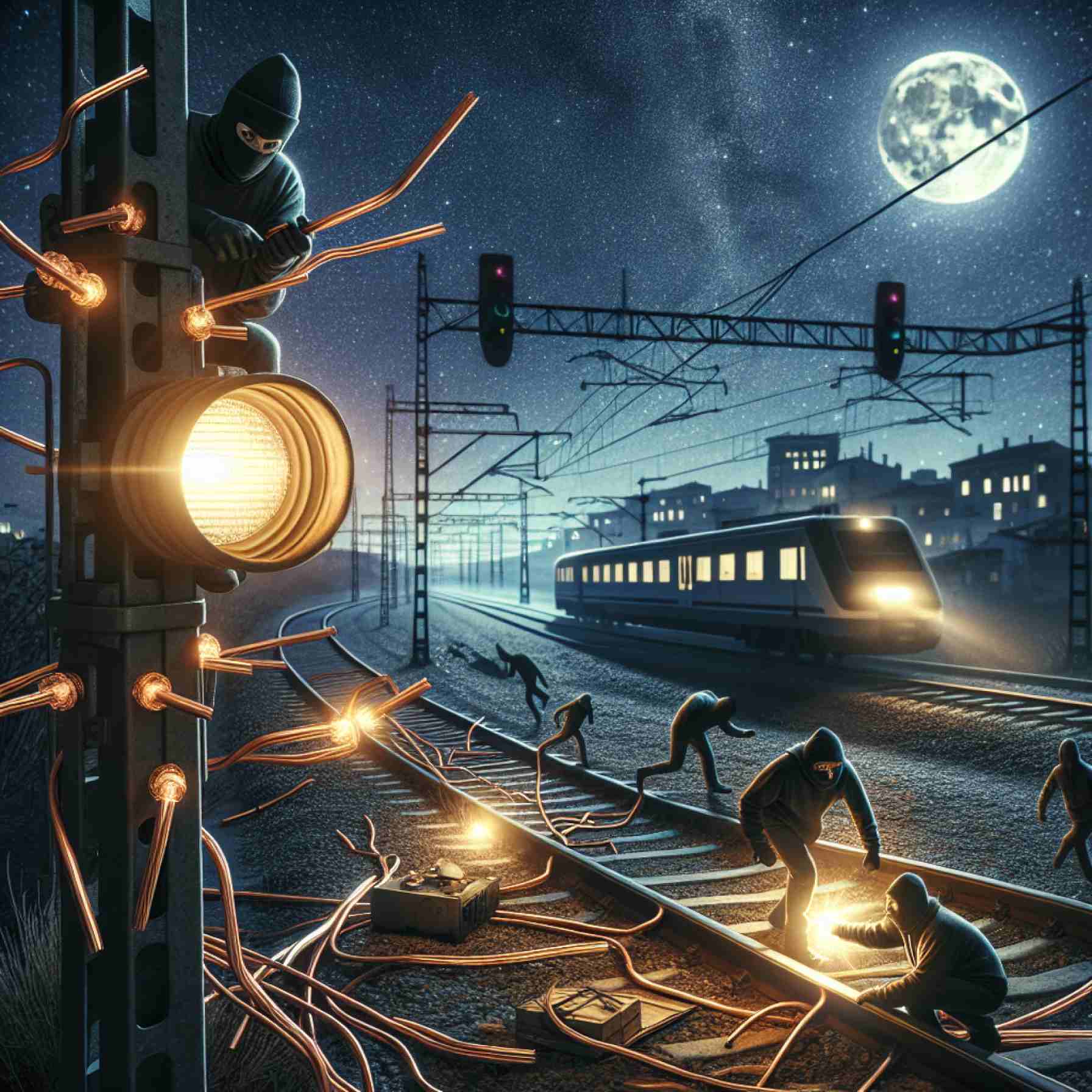
- The Spanish railway system faces repeated disruptions, notably from copper cable theft in Andalucía, causing significant travel interruptions.
- The Federación Andaluza de Agencias de Viajes (FAAV) demands immediate government action to overhaul the rail network, emphasizing resilience and reliability.
- Continuous railway issues risk damaging Andalucía’s tourism-dependent economy, as traveler confidence declines with each incident.
- The FAAV advocates for technological enhancements, stronger security measures, and better passenger compensation to restore trust.
- For Spain, the stability of its railway infrastructure is crucial, both for economic growth and maintaining the allure of travel.
- There’s a collective call for investments that will transform the railways into a secure and dependable transportation system.
A crisis is unfolding on the rails of Spain, as repeated disruptions shake the very foundations of the nation’s railway infrastructure. Recently, an audacious act of copper cable theft immobilized scores of trains, stranding countless passengers in the vibrant region of Andalucía. This disruption follows a pattern of power blackouts and mechanical failures that paint a stark picture of a system teetering on the edge.
The Federación Andaluza de Agencias de Viajes is sounding the alarm, urging the Spanish government to take immediate action. They argue for a sweeping overhaul, one that not only addresses the visible scars of these incidents but redefines the core of Spain’s rail network—transforming it from a symbol of uncertainty to one of resilience.
Imagine settling into your seat on a sleek train, expecting a journey of scenic landscapes unfolding in perfect rhythm, only to find your travel plans derailed by another unforeseen halt. This is the unsettling reality faced by travelers and an ever-growing concern for the tourism-dependent economy of Andalucía.
According to Luis Arroyo, the energetic voice behind the FAAV, the railways were once heralded as a pillar of sustainability and reliability. Today, however, they have become an unpredictable gamble. He frames the situation as a recurring nightmare, marring the allure of train travel at a time when tourism in Spain is yearning for stability and growth.
Tourism, the lifeblood of Andalucía, thrives on the promise of seamless connectivity. Yet, as trust in the railways erodes, so too does the confidence of visitors to this sun-drenched region. Arroyo warns of the ramifications—a domino effect that starts with apprehensive tourists and echoes across travel agencies, hotels, event businesses, and the broader economy.
The message from the FAAV is unequivocal: the current model is unsustainable. There is an urgent need for technological fortification, improved security strategies, and a rejuvenation of the railway infrastructure. The federation calls for tangible investment, proposing enhanced surveillance systems and an effective passenger compensation framework, steps they are eager to pursue in collaboration with governmental bodies.
The enchantment of travel lies in its promise of discovery, not disappointment. For Spain, a country that draws strength from its vibrant tourism industry, ensuring the reliability of its trains is not merely an infrastructure concern; it is an economic imperative. Arroyo encapsulates this sentiment, urging a decisive break from the cycle of disruption towards a future where every train journey reaffirms trust and excitement. As the calls for reform grow louder, the hope is for action that transforms the rails into the arteries of a thriving, dependable transport ecosystem.
Spain’s Railway Crisis: Understanding the Massive Infrastructure Overhaul Needed
Overview: The Crisis on Spain’s Rails
Spain is currently facing a significant challenge with its railway infrastructure, as repeated disruptions and incidents such as copper cable thefts have led to numerous train delays and cancellations. This situation is especially critical in Andalucía, a region heavily reliant on tourism. The Federación Andaluza de Agencias de Viajes (FAAV) has highlighted these issues, calling for an overhaul to ensure the reliability and sustainability of Spain’s railways.
Digging Deeper into the Railway Crisis
1. Copper Theft: A Persistent Problem
– Copper cable theft is not unique to Spain and has been a growing concern in various countries where railways rely on copper for signaling and electrical systems. These thefts not only disrupt services but also point to security vulnerabilities within the infrastructure.
2. Technological Gaps and Aging Infrastructure
– Spain’s rail network, despite being one of the most extensive in Europe, struggles with technological upkeep. Many parts of the infrastructure are aging, requiring modernization to handle increasing passenger and freight demands. There’s a critical need for updated signaling systems, electrification, and digitalization efforts to make the network more resilient.
3. Economic Implications on Tourism
– Andalucía, and indeed much of Spain, depends heavily on tourism. Unreliable train services can significantly impact the tourism sector, leading to decreased visitor numbers and affecting related businesses. The call from FAAV underscores tourism’s dependency on seamless and dependable transportation networks.
4. Proposed Solutions and Reforms
– Enhanced Surveillance Systems: The installation of sophisticated surveillance could deter incidents like copper theft.
– Compensation Framework: Implementing a robust system to compensate passengers for disruptions could restore some consumer confidence.
– Infrastructure Investment: There is a need for massive investment in modernizing tracks, signals, and digital infrastructure to prevent mechanical failures.
5. Security Measures
– Strengthening security by installing advanced monitoring systems along tracks, particularly in remote areas prone to thefts, can mitigate risks. Collaborations with local law enforcement can further ensure strict vigilance.
Real World Use Cases and Market Forecasts
– Technological Investments: Rail companies globally are exploring AI and IoT solutions to predict maintenance needs and prevent disruptions. Spain might see similar trends as it moves toward a more robust infrastructure.
– Market Trends: As the demand for sustainable and reliable public transportation grows, the rail sector is expected to invest in greener technologies and energy-efficient train systems. Spain has an opportunity to set an example in Europe by integrating these solutions.
Pros and Cons Overview
Pros:
– Economic Boost: Improved railways can rejuvenate the tourism sector, boosting local economies.
– Environmental Benefits: Trains are generally more sustainable than cars or planes, aiding Spain’s environmental goals.
– Regional Connectivity: Enhancements could improve connectivity across regions, facilitating easier travel for residents and tourists alike.
Cons:
– High Initial Costs: Overhauling the rail network will require significant financial investment.
– Implementation Challenges: Large-scale infrastructure projects often face delays and logistical challenges.
Actionable Recommendations
– Immediate Security Enhancements: Begin with low-hanging fruits like increased patrols and better surveillance.
– Stakeholder Engagement: Involve multiple stakeholders, including local governments, private sector players, and community leaders, to collaborate on sustainable solutions.
– Public Awareness Campaigns: Educate the public on new safety measures and encourage cooperative efforts to protect infrastructure.
Spain’s railway crisis is a multifaceted issue requiring immediate attention and long-term planning. Restoring confidence in the railways will be pivotal not only for tourism but for sustainable national development.
For more insights on the developments in Spain and across the world, visit Spain Info and INECO.



